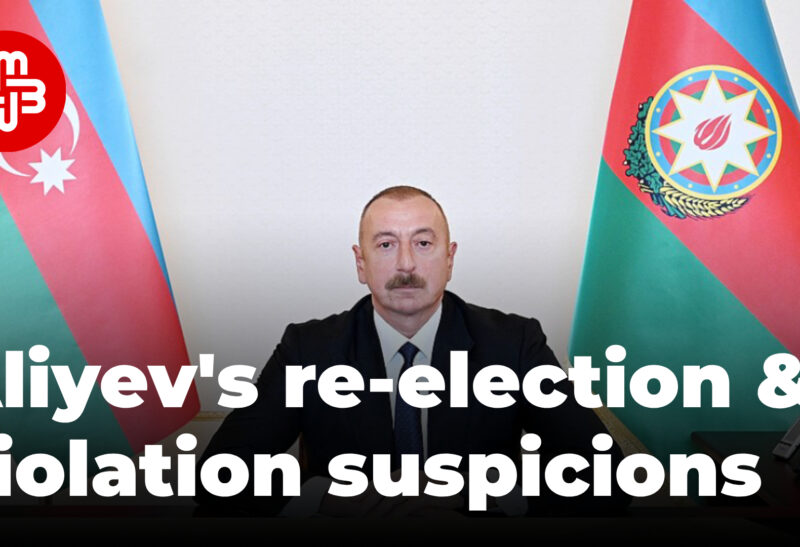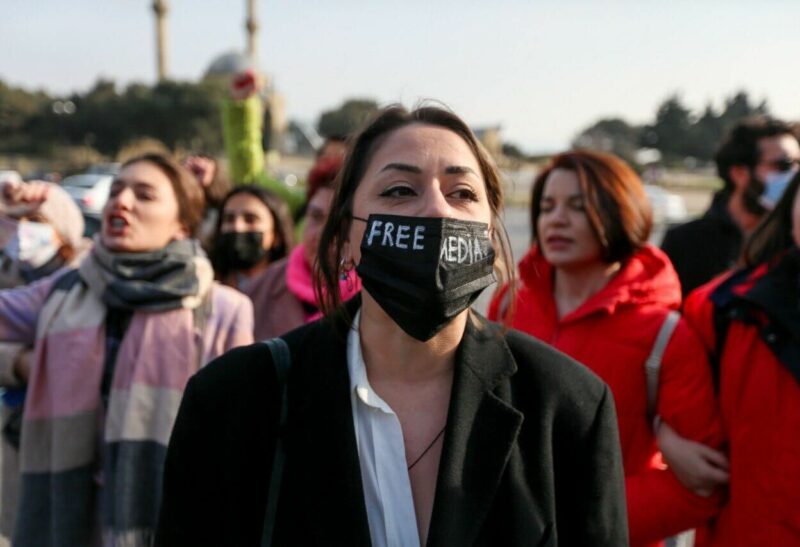
The Middle East is the hottest point on the planet. And given that this year in Azerbaijan is the year of Islamic Solidarity, things are about to get a little warmer in Baku as well.
Conflicts in Palestine, Iraq, Libya and Yemen continue to destabilize the situation, while the war in Syria is creating tension in neighboring regions including the Caucasus.
Former General Secretary of the League of Arab States (LAS), Egyptian diplomat Amr Moussa, discussed this at the Fifth Global Baku Forum in March 2017.

He believes that cooperation with Azerbaijan is important for the Arab countries not only because Azerbaijan is part of the Muslim world, but also, he noted, because cooperation in the areas of trade, investment, and tourism might bring fruitful results.
Additionally, nowadays in Azerbaijan one senses the heightened interest of Arab tourists, especially after February 1, 2016, when a simplified visa regime was adopted for citizens of Qatar, Oman, Saudi Arabia, Bahrain, Kuwait, and a number of other countries.
On the one hand, the inflow of tourists cannot fail to cause smiles, since it will lead to new investment. But on the other hand, integration with the Arab countries means their problems will have an influence on Azerbaijan. Amr Moussa stated that the Middle East cannot be separated from the Caucasus region, and that he hopes that in the near future the Arab states will resolve the crises that are not permitting other countries in the region to plan out their foreign policy priorities.
Despite this, Azerbaijan has thus far managed to maintain a balance. But it should be noted in this regard that Saudi Arabia and Azerbaijan’s southern neighbor, Iran, are far from being partners. Not to speak of the Israel-Azerbaijan partnership.
Relations between the Arab countries have never been stable and have seen abundant sharp turns. It’s enough to remember the schism in the League in 1967, after defeat in the Arab-Israeli Conflict. Or Egypt’s de-facto recognition of the state of Israel in 1977 and the signing of the Camp David Accords in 1979. Disagreements connected with the war in the Persian Gulf formed a serious crack in the fundament of the LAS. But the balance of all the contradictions was the greatest state of the Arab world: Egypt, which distanced itself from extremisms and smoothed out rough edges.
The situation changed with the Arab Spring, when several countries decided to make use of the instability to strengthen their positions. Qatar, wishing to increase its influence, supported the Muslim Brotherhood: in 2011, they took almost half the seats in the parliament of an embroiled Egypt, and the next year their pick, Mohamed Morsi, became president of the republic.
Although, he was deposed a year later.
Some voices assert that this was the result of Saudi money. In 2016, the Ministry of Internal Affairs of Saudi Arabia announced the execution of Shia preacher al-Nimr, convicted of supporting terrorism. This provoked an attack on Saudi Arabia’s embassy in Iran. As a result, Bahrain and Saudi Arabia announced they were severing diplomatic relations with Iran. The Libyan and Syrian conflicts also don’t enable an improvement in relations between the Arab states.
The plan was to discuss all these problems at the League of Arab States summit in the capital of Jordan, Amman, which was not chosen at random.
Jordan is famous for its role as a mediator. Moreover, it contains a Palestinian refugee camp on its territory. Jordan’s leader, King Abdullah II, has managed to maintain good relations with the leaders of the Arab countries. And, unsurprisingly, the ruling, royal family of Jordan is of the Hashemite Dynasty, who are members of one of the main clans of Mecca, tracing their lineage to Hashim, great-grandfather of the prophet Muhammad, and Abdullah II is considered a 41st-generation descendent of the prophet.
Additionally, his great-grandfather, King Abdullah I, was the founder of modern Jordan. King Abdullah’s authority is additionally based on the fact that he managed to relatively painlessly lead his country through the Arab Spring period. A significant factor is that King Abdullah II is married to a Palestinian woman from a common family, which was forced to flee Kuwait as a result of the Iraqi occupation, which aids the popularity of the royal family among the people.
As head of the NGO Jordan Humanitarian Fund, which helps women participate in economic life, Queen Rania Al-Abdullah so successfully blends the characteristics of a ‘true Arab woman’ with the outward appearance of a Western supermodel, and in her wardrobe she so successfully combines traditional Arab garb with Western-style clothing, that Giorgio Armani named her his life’s “ultimate muse”.
The summit was perhaps the most representative in all the LAS’s history. Eighteen presidents, kings and princes from around the Arab world participated. At the summit’s opening, the King of Jordan touched on the primary issues facing the Arab world, among which the primary question is Palestine.
According to him, the only resolution for the Israel-Palestine conflict will be the creation of “two states for two peoples” in accordance with the Saudi initiative, which was adopted by the summit in 2002 in Beirut, and recognition of a Palestinian state along 1967 borders, with its capital in East Jerusalem. He called the Israeli settlement policy a hindrance and emphasized that Jordan will not agree to a change in the status of the Temple Mount and that Islamic holy sites in Jerusalem will remain under Jordanian control.
Egyptian President Abdel Fattah el-Sisi spoke in a similar vein, saying that the problem of Palestine “is foremost in the hearts of Arabs”. However, it’s doubtful that such an initiative will find understanding in Tel Aviv, especially if we take into account that, at a meeting of ministers of foreign affairs which preceded the summit, an address was adopted calling for “a distinction between terrorism and legitimate resistance against the Israeli occupation” and calling for “the activities of Lebanese organizations resisting the Israeli occupation” not to be considered terror.
Libya is no less complicated a problem. There was a time when the Arab League, on the initiative of Saudi Arabia, opposed Muamar Gadhafi, supported the isolation of Libya, and recognized the Transitional National Council as the legitimate representative of the people. True, the General Secretary of the LAS, former Egyptian Minister of Foreign Affairs, Ahmed Aboul Gheit, has stated on multiple occasions that “exporting the revolution” was a mistake, and the summit in Amman confirmed its commitment to respecting the integrity and sovereignty of Libya, supported dialogue under the aegis of UN and LAS special representatives in Libya, and called for an end to the freeze on Libyan assets in foreign banks.
But a blow has already been dealt to the league’s authority in the eyes of Arabs.
Naturally attention was paid to the war in Syria as well. In November, 2011, the LAS suspended Syria’s membership because of repressive measures against the opposition, which was announced by Qatar’s Prime Minister Hamad bin Jassim Al Thani. He called on the Arab states to recall their ambassadors from Damascus and even offered the leaders of the Syrian opposition the proposition that they come to the Arab League headquarters in Cairo for a consultation. But today the head of the league, Ahmed Aboul Gheit, is calling on Arab leaders to facilitate the restoration of Syria’s territorial integrity and more actively contribute to the resolution of the Syrian conflict, calling it “the worst crisis in the recent history of the region”. And indeed, the Secretary-General of the UN, António Guterres also called on the participants in the summit to lay aside their disagreements for the sake of bringing an end to the war in Syria. But the prospects for this are very murky. There are more than sixty Syrian opposition groups with various orientations. The likelihood that all of them are capable of coming to some sort of consensus is close to zero, even more so because the disagreements are strengthened by the centuries-long opposition of Shiites and Sunnis. Bashar al-Assad and the overwhelming majority of the Syrian leadership are Alawites, who are close to Shiite religious teachings. Because of this, Iran, where the state religious is Shiite Islam, supports the Syrian leadership, which furthers its rivalry with Saudi Arabia. Whereas Jordan, Turkey, Saudi Arabia, Qatar, and Egypt follow Sunni Islam and share the faith of the majority of the population of Syria and Assad’s opponents.
Israel’s position is laced with intrigue: since the Golan Heights were captured in the Six-Day War in 1967, Israel has essentially been in a state of war with Syria and periodically delivered rocket strikes within its territory.
That being said, Tel Aviv isn’t striving for Bashar al-Assad’s ouster, clearly believing that the dissolution of Syria would present a significantly larger problem that the present regime. Just ten days before the summit, it was reported that the Israeli air force had delivered a strike on a store of missile armaments owned by the Shiite organization Hezbollah, which supports Assad. That same day, Minister of Defense Avigdor Lieberman stated that Israel is not seeking an escalation of the conflict with Syria and would not wish to see a deterioration of relations with Russia, but will not allow for Hezbollah to obtain modern missile weapons.
As an aside, Moscow is proposing its own model for resolving the situation, believing that the Syrian opposition should sit down at the negotiating table without advancing any sort of preconditions. In a telegram to the participants of the summit, Vladimir Putin announced his readiness to cooperate with the League of Arab States with the goal of achieving an end to the war and restoration of the afflicted territories in the near future.
The summit agenda also included the Yemen conflict, which has been aggravated since 2015 because of military actions by a military coalition lead by Saudi Arabia against the militarized Shiite group Ansar Allah, which is supported by Iran. Iran was accorded particular attention. The summit condemned its interference in the affairs of the Arab states, calling on Tehran to refrain from actions that undermine regional security and stability, implying the occupation by Iran of three islands of the UAE: Abu Musa and Greater and Lesser Tunbs, as well as participation in the Syrian crisis. The future will show whether these calls have any influence on Tehran’s policies. But on March 28, the very eve of the summit, Iran’s President Hassan Rouhani visited Moscow. Sixteen agreements were signed. But through the talk about cooperation, one can clearly see an interest in the Syrian conflict, where Iran and Russia and adhere to the same position to such a degree that Iran even allowed the Russian air force to make use of its Shahid Nojeh military base, though admittedly not for long.
Despite all attempts, one cannot sense a united position at the summit. It goes without saying that a joint communique was signed, calling for stability to be returned to the Middle East. But the League of Arab States is not a monolithic entity; stability within it is suspect, and more than unstable. And the fact that the 2018 summit is planned to take place in the most influential country of the Arab world, Saudi Arabia, speaks to the fact that yet another attempt will be made to overcome disagreement.
Tamaz Papuashvili, PhD



